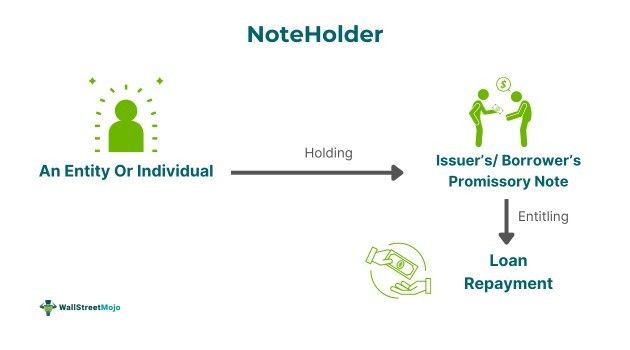Table of Contents
Noteholder Definition
A noteholder refers to a bank, person or entity that has provided a loan to a company in the shape of a bond or mortgage. It ensures the lender gets repayment of a debt or loan through the right to receive payments from the borrower according to promissory note specifications.

The right given to lenders plays a significant role in various financial dealings like mortgages, business financing and student loans. They have been crucial in the United States' financial ecosystem due to their involvement in bankruptcy, foreclosures and probate. They have become part of bond markets and securitization under complex financial structures.
Key Takeaways
- A noteholder means a miscellaneous organization, a bank, or an individual that has provided money to a business by investing in the form of bonds or mortgages.
- It ascertains that the lender receives repayment of a debt or loan by giving them the right to collect payments from the borrower per a promissory note's term.
- It can be an entity or individual holding a promissory note acting as a lender, while a shareholder can be an individual or entity owning a company's shares and becoming a part owner of a company.
Noteholder Explained
A noteholder in finance represents an entity or individual holding a promissory note, enabling them to get paid back for their loan from the borrower. Meanwhile, they also have the right to deduce payments from loan takers per the promissory note's terms. Further, the promissory note can make them the subsequent holder or original lender. They have the right to enforce terms contained in the note and collect timely payments from the borrower like foreclosure initiation when they default.
In case of legal proceedings like probate, bankruptcy and foreclosure, they have a vital role to enact. Additionally, they can depict the entities' interests and take part in complex financial systems like bond markets and securitization. However, if any change takes place in the holder of the note, then it can impact the status of other stakeholders and bondholders. Notes purchased by holders help lend money to the issuer in return for periodic interest payment until maturity, when the full principal amount has been paid.
They become useful in corporate financing by way of capital raising. They facilitate refinancing pre-existing debt, managing cash flow and fund projects. Therefore, their flexibility makes them a key tool in strategic growth and financial growth. Further, holders of notes make such investment decisions so as to affect the market dynamics, overall economic stability and interest rates. They also act as a reflector of wider investor sentiment in the market.
The structure of the notes of the holder varies between secured and unsecured, which might affect return and risk. Holders of note offer a legally binding and formal method to enforce and document debt repayment. Finally, they maintain the functionality and integrity of credit markets through a reliable system of debt reinforcement.
Examples
Let us understand the topic with the help of a few examples.
Example #1
An online article published on 25 April 2024 discusses the current bankruptcy case on WeWork centered on the objections put forward by a random group of its holders of notes. The said group vehemently criticized the case's slow progress, giving reasons that until now, no negotiations have taken place. They said that since the event of adjournment of the examiner motion negotiations were due despite all agreed collectively ten weeks earlier. Besides, the group requested the bankruptcy court of New Jersey to reschedule the hearing pertaining to the examiner's motion for 30 April. Moreover, they blamed the delay on the part of conflict between the ad-hoc lender committee, Softbank and Cupar over exit financing or continued DP.
They gave a warning regarding the lack of liquidity in WeWork and were concerned about its ambiguous disclosure statement failure to resolve key issues along with the absence of any recovery rate for creditors. They have also asked for court mediation and measured the action of the company in rejecting the interest of founder Adam Neumen to buy the company. As per reports, WeWork has been valued at:
- Enterprise value= $650-850 million
- Midpoint value = $750 million
- Equity value = $665-865 million with the assumption 15 million as emergency excess cash.
Example #2
Let us assume that an investor, Jessica, in Old York, purchases a $100000 promissory note from Greenmake Limited, a green energy startup. Greenmake issued promissory notes to raise capital for developing their fresh solar projects in California. As Jessical has bought its note sh,e has become entitled to annual interest at the rate of 5% during the coming 5 years and principal repayment at the end of the maturity of the note.
Being the holder of the note, Jessica can legally claim over the firm's assets by default. She derives these benefits from her note holding- she earns regular income, diversifies her investment portfolio and lends support to green energy. Meanwhile, Greenmake successfully gets access to the necessary capital for buying solar panels and hiring engineers.
